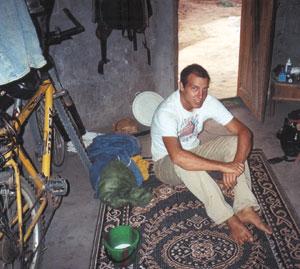
“He assured me that the Peace Corps didn’t send any one where there was any type of unrest,” said his mother “And if something were to happen while he’s there, they’ll get him out. But I’ll probably never be fully comfortable with the idea until he’s back in America. I think it’s a great thing he’s doing and I admire him for doing it. I get to live vicariously through him, but I’d still like to have him back home.”
Sitting half a world away in a small concrete hut with a thatch roof, Justin Kosoris serves as a Peace Corps Volunteer in Senegal
Kosoris in Senegal
By JONATHAN BLUNDELL Daily Light staff writer
Monday, June 19, 2006 11:37 AM CDT
Sitting half a world away in a small concrete hut with a thatch roof, Justin Kosoris is in the midst of a two-year adventure with the U.S. Peace Corps.
A 2005 graduate of Johns Hopkins University, Kosoris shocked his mother last March when he informed her that he was considering a two-year position with the Corps.
“He called me and I was completely shocked,” Susan Kosoris said. “Many people can tell you exactly where they were and when they heard that President John F. Kennedy was killed. I can remember exactly where I was and when it was that he told me he wanted to join the Peace Corps.”
Justin told his mother he would be stationed in Senegal, Africa, and her first thought was the possibility of violence in the region.
“He assured me that the Peace Corps didn’t send any one where there was any type of unrest,” Susan said. “And if something were to happen while he’s there, they’ll get him out. But I’ll probably never be fully comfortable with the idea until he’s back in America. I think it’s a great thing he’s doing and I admire him for doing it. I get to live vicariously through him, but I’d still like to have him back home.”
Susan said Justin’s interest in foreign service began when he was a child.
“I think Justin was always interested in foreign service of some kind,” Susan said. “He was always interested in foreign things like maps, animals and different countries.”
Justin was a Spanish major at John Hopkins and he’s taken French classes since he was 6 years old.
“He’s just always been interested in foreign things,” Justin’s younger brother, Kevin, said. “He even volunteered in the community during high school using his Spanish.”
Kevin, a junior at William and Mary University, had the opportunity to visit his brother in Senegal in March.
“It’s a different world there,” Kevin said. “I’ve been to Europe and lived in Spain last summer. I’ve even visited Morocco, but the differences are enormous. In Dakar (the capital of Senegal), there is a lot of European culture there, but out in the villages where Justin is, it’s a different world. His hut is made of thick concrete walls and during the day the temperature can get up to 140 degrees. His thermometer broke the other day, so it was probably much hotter than that.”
Kevin recalled the 11-hour trip from the airport to Kolda, the largest city near Justin’s village.
“There was a parking lot full of taxis,” Kevin said. “They say you have to get there early in the morning to get a ride. And they fill the taxis with seven other people before you can leave. So you get to know the other people very well on your trip.”
From Kolda to the village is another 45-minute bike ride.
“It’s a real quiet, simple life there,” Kevin said. “I was there just before planting season and we did a lot of visiting with people and sitting around in the shade.”
While the national language of Senegal is French, most of the villagers spoke Pulaar.
To learn the language, Justin took intensive courses during a three-month training period, before moving to Senegal.
“He learned a lot of the language during training,” Kevin said. “But he’s learned a lot more while living in the village. Luckily some of the teenagers spoke real broken French so I could communicate with some of them.”
Justin’s assignment with the Peace Corps gave him no specific directions, other than to help the villagers agriculturally with things like crop rotation and soil erosion.
Before his training with Peace Corps from September to December of last year, much of his agricultural training came from an internship at the Fair Park Botanical Gardens and his family garden at home in Waxahachie.
“He’s been frustrated at times with people’s complacency,” Kevin said. “He’s trying to help people make money and show them how they can grow the things they usually have to buy but they’ve become complacent at times.”
“They know nothing else,” Susan said. “There’s no electricity, no running water and most don’t travel more than a mile or two from the village.”
But while working with the villagers, Justin has been able to help them learn to grow okra, which they use and sell to the entire region of Kolda.
Justin has also begun work on a goose-raising enterprise with the villagers.
“Most of the funds are provided by the few people I will be working with and the goal is to develop a sustainable and profitable program that will enable the one or two households involved in the project to not only get money, but to have a source of meat for their families,” Justin wrote in a recent e-mail to his mother.
“These are people who in a year might make $100,” Kevin said. “It was difficult for Justin to not say, ‘Here’s what $200 can do for your village.’ He was ready to give his own money to help the people. But instead of throwing money at the people, he’s working to help them better themselves.”
Susan said Justin still calls home frequently with his cell phone and she looks forward to his monthly e-mails, sent from Internet cafes in nearby cities.
“He still gets cell phone service in the village,” Susan said. “He has a solar-powered charger for his cell phone and iPod but he tries to keep those things hidden from the villagers. He encourages us not to send anything of real value.”
During his March visit, Kevin brought his brother a six-pack of Dr Pepper, bean dip and a bag of Fritos.
With a diet consisting mainly of rice and millet, the American snacks were greatly appreciated.
“It was like a kid at their first Christmas,” Kevin said. “He was in heaven. It’s hard to send much in care packages. Packages are often ripped open and then just taped back together. We sent a jar of almonds and by the time it got to him, half of them had been eaten.”
And as June and the rainy season comes, Justin writes that he’s looking forward to even more opportunities to learn more about the local agriculture and learn more about the Senegal people.
“I think I will have a lot to do and I will really be forced to learn about agriculture,” Justin wrote. “The rainy season will also be the final season I really haven’t seen in Senegal and I will learn that much more about Senegal and my village that I haven’t been able to witness up to now.”























